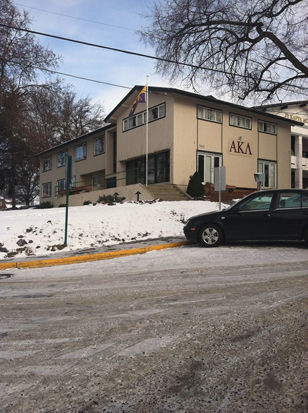Rebuilding with a solid foundation and leadership

Alpha Kappa Lambda was reinstated as a recognized chapter on the WSU campus in 2013. Since then, the organization has worked on building membership, coaching leaders and getting involved in the community.
February 4, 2015
In 2008, a member of Alpha Kappa Lambda (AKL) stood on the front porch of his residence: the live-out. He was being arrested on two counts of delivering a controlled substance—cocaine—to a federal informant.
Seven years later, after losing and then regaining recognition by both Washington State University and the Interfraternity Council, AKL has a new set of members determined to redefine their chapter.
Marshall Huff, a senior member and formal scholarship chair of AKL, joined the fraternity in 2011 when four older members recruited his freshman pledge class.
While AKL had no university recognition at the time, AKL’s national organization still acknowledged their existence. They lacked the local support needed to be actively involved in their community, but had enough national support to remain a presence on campus.
After the federal investigation into AKL’s drug involvement, most members resigned, Huff said. About a year later, they lost their right to live in a fraternity house.
The four remaining members decided to use this opportunity to rebuild their brotherhood and reinvent their fraternity’s image, Huff said.
According to the official court appeals released in September 2009, the federal investigation that lead to the arrest of an AKL member revealed that other fraternity members and officers were sold cocaine by this individual. All of this was done through AKL’s live-out residence, not the fraternity house itself.
Shortly after the initial arrest, another member was arrested for tampering with evidence.
A large supply of Ritalin and Adderall, packaging material and a digital scale were also found in the apartment of an arrested member.
This investigation revealed more internal issues that lead to further charges regarding underage drinking and hazing, according to the appeal. WSU’s Conduct Board immediately shut down the fraternity for a period of five years, with a two-year disciplinary probation.
The appeal states that this period was designated to make sure that all AKL members in 2008 would graduate and leave WSU before recognition was regained.
In spite of this, a legacy was still maintained and repurposed when the four remaining members invested in their 2011 pledge class.
Huff, being one of these pledge class members, has taken it upon himself to invest in the evolving chapter.
After living in live-outs for two years, he said, the fraternity applied for reinstatement in the fall of 2013. The following semester, spring 2013, they were recognized once more by both the university and the Interfraternity Council.
“This was monumental for being kicked out,” Huff said.
AKL was able to move back into their fraternity house, which was temporarily occupied by Sigma Pi, and participate in Homecoming Week again, he said. They recruited two new pledge classes and began tackling philanthropic events once more.
“AKLs are men of character,” Huff said, “people that are going to stand out in their community; people that are going to wear their letters in the workplace, in the street, anywhere.”
Kris Gonzalez, junior member and current president, said new members need to be leaders. Each individual needs to set an example and carry on the legacy of structure current officers are trying to develop.
“Last year we were given a house but no structure,” he said. “We are building a foundation from the ground up to continue what we have been doing. We are slowly remodeling a house and building a brotherhood because of it.”
Each new member is given a full or assistant leadership position shortly after initiation, Huff said. It is important for current officers to instill leadership capabilities in these men.
“We started with nothing,” said junior member and current vice president Brian Grimsley. “We want them to have the same initiative we have.”
This initiative has driven current officers to demonstrate their values of leadership, scholarship, loyalty and self-support.
“It’s one thing to talk about it,” Huff said. “It’s another thing to live it.”
He acknowledges that spending time at parties is “all fine and well,” but a brotherhood goes far beyond the superficial.
It’s something to be proud of, Huff said.
AKL’s chapter has a lot to be proud of too, Grimsley said.
AKL has been a fraternity for nearly 100 years, he said. The local Eta chapter is one of the few AKL chapters with a sustainable house of their own.
On a national scale, the fraternity established itself as the first a non-secretive organization, Grimsley said. All of their rituals and events are public knowledge.
It’s this pride that pushes the current crop of leaders to actively seek connection with the university and other groups in the community, Grimsley said.
“It’s important we work as one community,” Huff said.
AKL has recently extended an offer to work with community members by adopting a highway near the dunes along Snake River to keep clean. AKL is actively recruiting new members.














